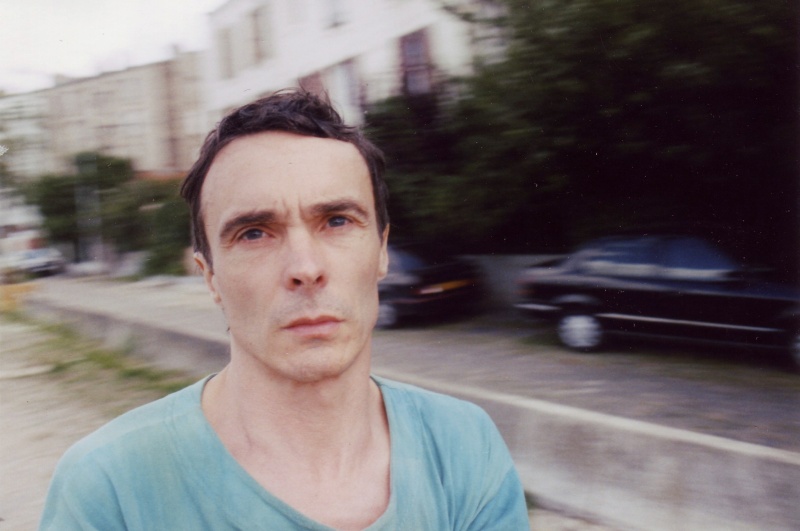Karolina Sulej: I admit that when I’d found out about your show, I wondered about ways you’re going to shock the polish audience. I thought – Is he going to puke? Pretend to have sex? Whip himself? Cut himself? Yet on the stage I saw a slender man in his forties, wearing black corduroy trousers, black t-shirt and shoes that looked like they have endured a few seasons. And he started to recite. In front of him there was a mike and a stand for pages of “Justine”. The whole spectacle consisted of you, words of Marquis de Sade the way you interpreted them. All the work was on the side of imagination. No radical acts. You don’t want to shock anymore?
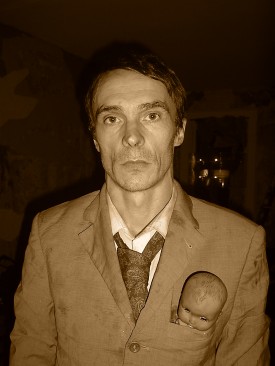 Jean-Louis Costes, photo: CostesJean-Louis Costes: On the contrary. The stage is for unhinging the audience, who come to see me with certain expectations. But this time what I wanted above all is to put myself to the test. See, if I can make a spectacle without using my usual means of expression – without music, with no props, no alcohol. I never drink in my daily life, but I always drink while performing. I go on stage and drink as much as I can. It’s like a ritual for me. Every performance is intense, very physical. But be careful not to confuse it with reality. It is just theatre – the sex, physiology, aggression – everything is being played, not, how should I put it, “lived”. Audience expected transgression and confrontation with all the stuff you can read about me on the net. But I wanted to shock them by not fulfilling their expectations. I stood and read the text. The audience was doing all the rest in their heads with held of Sade’s words. The context of the exhibition is also important. Sade is the last accord of the rococo period. The darkest one. I wanted to bring him to life, so he could literally take control over the space, dominate everything. It could be achieved thanks to marvelous sound director. I felt like I was delivering a very naughty sermon in a huge cathedral.
Jean-Louis Costes, photo: CostesJean-Louis Costes: On the contrary. The stage is for unhinging the audience, who come to see me with certain expectations. But this time what I wanted above all is to put myself to the test. See, if I can make a spectacle without using my usual means of expression – without music, with no props, no alcohol. I never drink in my daily life, but I always drink while performing. I go on stage and drink as much as I can. It’s like a ritual for me. Every performance is intense, very physical. But be careful not to confuse it with reality. It is just theatre – the sex, physiology, aggression – everything is being played, not, how should I put it, “lived”. Audience expected transgression and confrontation with all the stuff you can read about me on the net. But I wanted to shock them by not fulfilling their expectations. I stood and read the text. The audience was doing all the rest in their heads with held of Sade’s words. The context of the exhibition is also important. Sade is the last accord of the rococo period. The darkest one. I wanted to bring him to life, so he could literally take control over the space, dominate everything. It could be achieved thanks to marvelous sound director. I felt like I was delivering a very naughty sermon in a huge cathedral.
Did you expect that kind of audience?
I didn’t expect such elegance and class. I am an underground artist, which you can translate as: an artist that expects the best and the worst from the audience, like being hit on the head by members of the public. There’s no security during my shows. Recently though I was performing in well-know club with solid security and it didn’t prevent people from throwing three bottles in my face. Fortunately I move a lot on stage so I’m not an easy target. Some fans have strange ways of showing their desire to participate. By acts of aggression for example. It’s so punk.
You like to think of yourself as a punk-rock artist?
Jean-Louis Costes
Jean-Louis Costes is a musician, performance artist and film actor. He performed in Królikarnia in Warsaw at the closing of the Ladies with a Dog and Monkey exhibition. It dealt with modern views of rococo aesthetics. The performance referred to Markiz de Sade. Costes creates an act so overstressed and socially critial, as de Sade’s works. His unconventional ways of expression are criminal for some. For the last 13 years he took part in a lawsuit. Costes was sued for disseminating racial hatred. The performance in Królikarnia was one of the first ones after he won the case.
I like to define myself as an underground artist, but it doesn’t mean I feel a part of any community. In my kind of art I’m very singular. No one does what I do. I do shows, I write books, I make movies, and most of these I do by myself. I have no management, no PR, no label, no one is responsible for my image. I started to shoot movies when I figured out that it would be nice to archive the shows. I publish it on my website because I want to show that I’m not like other people paint me to be.
I stood out from other artists most vividly in the 80s. Everyone listened to industrial music then, dressed in black and yelled “DEATH” to the microphone. Imagine a guy that goes on stage and sings in high-pitched voice funny songs about sex and then issues his DIY records with colourful covers. Yuck! They wanted to kill me. Today the scene is much more complex, fortunately. It’s easier to fit in.
I make music that is labeled as noise, so I’m invited to noise festival sometimes. I play on stage. It’s drama, so I’m invited to theatre festivals. There’s nudity in my shows, so I’m also invited to go-go clubs. Because I make fun of political correctness and generally I’m “hardcore”, I’m invited to punk rock concerts. Plus – sometimes I do shows for national galleries, get into the realm of mainstream art – but always as a curiosity.
Wherever you go, you have to deal with expectations.
They always expect something else. Fans of noise wanted me to stand hooded and gloomy behind the console. Fans of theatre wanted to see the narrative, not just a guy who does things you can find in films marked with the red squere and makes fun of it. People who wanted to see staged sexual fantasy were disappointed seeing that my nudity is completely asexual. Punks think my shows are too sophisticated. Big galleries don’t take me seriously. Even my own child says that her father does gros-betises. She doesn’t no how to call my profession. I don’t go the office every morning, like other dads. My daughter would probably want it that way though. She wouldn’t feel different from her peers. I don’t know if I want to burden her with my own maladjustment.
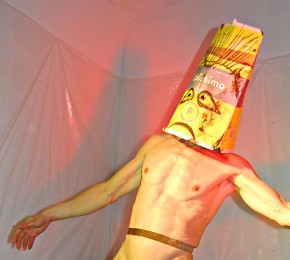 Costes during a performance, photo Yukiko
Costes during a performance, photo Yukiko
I found a short story that you wrote bout your grandfather. I didn’t read it as a whole, but it begins with great hatred. Why did you hate your grandfather so much?
It’s a pity that you didn’t read it till the end, because then you would know that the sense of this story is not my hatred towards my grandfather but the gradual process of getting rid of hatred in exchange for tenderness and understanding. My grandfather was from Algierie. He felt like he’s a second rate citizen in France. He was poor, frustrated, angry at everyone, especially at the French government. As a child I experienced his hatred too. I didn’t understand why he has to hurt me. I thought he was a monster. I was ashamed of his poor French, of his coarseness and that it showed that he was poor. Kids can be awful. I had to grow up to understand why he behaved this way.
In the beginnings of your carrier, you worked with your then-wife, artist, writer and feminist, Lisa. You had a band – Suckdog and toured the world with your noise porno-operas. Your relationship was extremely romantic and from what I can see on your webpage, you’re still friends. And Lisa writes: “The Costes family was bourgeois and catholic. Two of Jean-Louis’ brothers committed suicide and the third emigrated, so I gather the home life was difficult for the boys growing up. Whatever it was that broke the spirit of his brothers only made Jean-Louis stronger – or just crotchety and stubborn. No one can stop him, and God knows many wanted to!”
This is naïve psychology. You can’t put the blame on the family and upbringing. I don’t think I was shaped by this. My father was in the army. So you can probably say, that I’ve become an artist to rebel against him. But the whole block of flats we were living in was packed with army guys. The majority of their children didn’t choose the artistic path. My father was strict and full of demands but I don’t think it’s because he worked for the army. Of course the fact that he had this kind of daily job affected my childhood. The same is with my family being catholic. The same with the fact that my grandfather was an immigrant. That we belonged to middle class, but my grandfather was still working class. That I had brothers. Finally that art was something that wasn’t of value in my family. It’s all too complicated to sum it up with one simple answer.
What’s your parents opinion on what you’re doing for a living?
They’ve never seen any of my shows, but generally they think I’m just a pornographer. When I performed with Lisa, back in the days, my father said that not only I am a poor artist but also I’m exploiting my own wife. But the biggest issue for him was that my shows were a joke. He was always serious. His father was serious. Grandpa had a war trauma, a trauma of poverty, a trauma of detachment. All this he transferred to my father. I refused to lift this weight. Maybe that’s why my father refuses to understand me.
Through your show you fight with various social taboos.
I just want to make a good show. I don’t fight with anything.
You don’t provoke?
No. I step on stage at given hour and step down at given hour. I would be provocative if I announced that I’m doing a show and… didn’t show [laugh]. Or plant a bomb in the club. Conceptual art is provocative too. Provocation would be to do nothing and get paid for it. It makes me mad. I give my 100% each and every time.
Are you aware what kind of political or social impact your show can have?
I’m aware to the extent, that after years of work, I know what to show where, so as not to be attacked. For example in France, if you connect Islam with sex in any possible way – you’re dead. Literally. Because of connections like that you can die for the sake of art. Be a martyr, be my guest. Situation is different when you choose subjects that don’t cause such tensions – you can only get beaten up or called a degenerate, homosexual etc. That’s all. Sex, on the other hand, doesn’t cause much fuss anymore. Sex is everywhere and within the law.
Unfortunately people have problems with separating reality from art. Art is being gaged. It can speak about anything as long as it’s not a burning social question. It can’t touch the “hot potatoes”, even though it is art’s main purpose. These kind of interventions are seen as dangerous, anarchic and artists are being pushed aside, being told to shut up.
You’ve suffered the consequences of one miscalculation for 13 years.
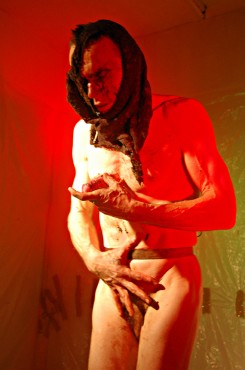 photo: YukikoIt was the longest trial in the history of France, it began in March 1997. It started with one man, important among the intellectuals, afterwards Jewish Students Association followed, and then almost all Frech antiracist organisations.
photo: YukikoIt was the longest trial in the history of France, it began in March 1997. It started with one man, important among the intellectuals, afterwards Jewish Students Association followed, and then almost all Frech antiracist organisations.
Why were they indignant at you?
They accused me of spreading racial violence and encouraging to murder. All because of one song Livrez Les Blaches Aux Bicots (Throw White Women to Arabs), to be precise, its lyrics. Today they would have sounded really harmless in comparison to what you can find on the net – but it’s not the case. The case is – if someone took a minute to reflect on what kind of artist I am, what reasons could I have, I would have never been sued. But they hated me. It was one of the first court cases devoted to content displayed in the internet and they didn’t know how to “get to it”. They practiced all their tricks on me. They called me a nazi. Today no one could take my words without inverted commas. Who can take a guy that sings “pipi kaka” seriously? But back then, I felt like Josef K. This endless pilgrimages to court, this sentence hanging over my head and became part of my daily life, also as an artist. When I was to perform in Geneve, local newspaper call me and my group a “troupe of Nazis”. Our show was cancelled by the police. For some people, I turned into a monster. I was an ideal scape goat in a political game between the left wing and the right wing. Extremists don’t joke. They have no sense of humour. The leftists hated me, because they assumed I behaved like a racist. The right wing hated me, because they thought I was making fun of them.
Luckily, it wasn’t the case with other artists, among which similar attacks are being heard of on daily baisis. People, in general, don’t understand art. Judges don’t understand art. They think that underground art is a kind of art practiced in basements! These basements are like caves, where artists hide with their rituals, surely satanic. Seriously!
How was the verdict justified?
The worst thing is that I didn’t won because it was decided that my song wasn’t rasist. They didn’t prove that it was racist too, though. The irony of it all is that from the very beginning of the trial this wasn’t the key issue. When the case started, the suit was already stale. It was too late to sue me, but the court needed another 13 years to decide that it really was too late. I’ve got no words for it. And in addition, I too feel like I‘ve been punished. Paying the lawyer was a constant punishment throughout the years.
The trial lasted for 13 years, but you work for more than 25.
I started in 1988. For a few years I treated it like a hobby, a had a normal day job. I studied architecture, than I worked in a design studio, I was a freelancer. My hobby turned out to be too demanding for my work to last. I chose the hobby and made it my new daily job.
Do you miss this “normal job” sometimes?
I miss designing. Building houses is such a down-to-earth proffesion. The walls, the roof, concrete, cement. It’s solid. Whereas art is abstract. No control lies in it. Architecture is an objective system, art is painful subjectiveness. Painful, because I hate almost everything I do as an artist. I’m never satisfied with myself. And how to you measure the value of art? You can’t ciritcise a solid, straight, concrete wall. You can criticise a guy who is running naked on the stage, if you choose to see only that.
How did you stumble on a thought that you want to be a guy like that?
Honestly, I don’t remember. It was a mistake, that’s for sure [laugh]. I was playing in a hardcore band with some guys, but I felt it’s not enough to impress the girls. I started to create my own shows. But I had no vocation. I never decided: “Now I want to be an artist.” I didn’t want to be like those performers from the 60s.
You’re being compared to GG Allin, the crazy American punk rocker from the 80s, known for his radical lyrics and equally radical performances, during which he broke beer bottles on his head, swallowed anti-depressants, cut himself and insulted virtually everyone.
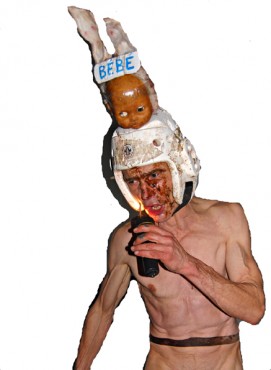 photo: YukikoHe was really fucked up. What I pretend to do, he was doing for real. He had a really great voice and a great courage but wasted it foolishly out of his inner destructiveness. He died after an accidental heroin overdose. His friends were taking pictures with the corpse thinking he’s only fallen in a deep sleep. It’s a sad ending. I don’t see myself up there. Allin overdosed at 36. I’m 57. I’ve built a house. I have a wonderful daughter. I’m not familliar with Allin’s life style.
photo: YukikoHe was really fucked up. What I pretend to do, he was doing for real. He had a really great voice and a great courage but wasted it foolishly out of his inner destructiveness. He died after an accidental heroin overdose. His friends were taking pictures with the corpse thinking he’s only fallen in a deep sleep. It’s a sad ending. I don’t see myself up there. Allin overdosed at 36. I’m 57. I’ve built a house. I have a wonderful daughter. I’m not familliar with Allin’s life style.
From the beginning of our interview I’ve been glancing at your hands. Where did these tattoos come from?
As a 20-year old I wanted to be a hippy. Aged 21, in comparison to my peers I was retarded. I was living with my parents, I had no girlfriend and I was awfully naïve. I decided to change my life and go on a trip to India. I didn’t realise that the hippies were the thing of the past. So I went to India and felt so cool. When I came back to France the truth dawned on me – I knew I was late. Everyone was already punks. And I couldn’t be one, because in India I had these hippie tattoos done! To make matters worse I was shy, rather silent and withdrawn. I even had a problem with buying bread in a bakery. On the way to the shop I practiced my lines. Fortunately, the stage opened me. I become a different person when I perform. As an artist I can transgress my deepest fears. My daily life doesn’t frighten me anymore. And I’m talkative, right?

